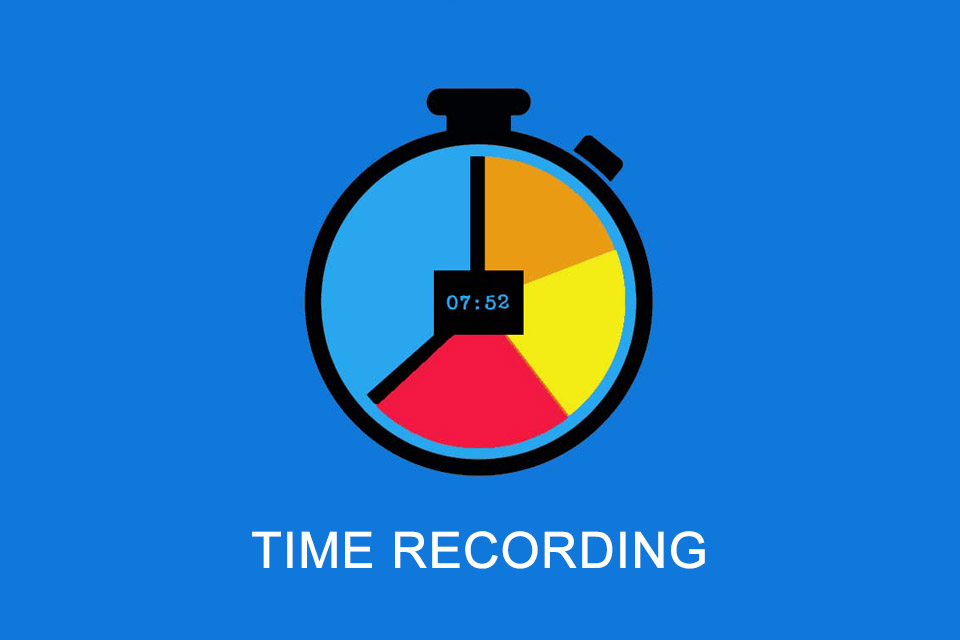Why is Time Recording important?
Time recording – a basis for billing and self-monitoring
Time recording describes the process of keeping the working times of employees in an organisation. The rules for recording working times vary from country to country. In Germany, the rules for recording working times are contained in the Working Time Act (Arbeitszeitgesetz, ArbZG). The regulations for handling the corresponding data for recording working times are defined in the Federal Data Protection Act (Bundesdatenschutzgesetz, BDSG).
Generally, time recording, which is sometimes also referred to as personnel time recording or simply as time tracking or time keeping, is basically an important instrument with which to
- employers control their workforce,
- employees document their working hours,
- contractor can provide evidence of work performed for the client.
For companies, it is the basis for payroll accounting and the administration of vacation and sick leave periods. It provides an overview of employees’ working hours and could – at least theoretically – help to identify unnecessary activities, improve cost estimates and establish habits and routines.
Protection for employees
In addition, time recording is also a protection for employees. The Working Hours Act (Arbeitszeitgesetz, ArbZG) regulates, among other things, maximum working hours, rest breaks and the employer’s obligation to record the working hours of employees over and above those agreed on each working day. It also offers the possibility of self-monitoring for employees who can recognize overtime and undertime as well as individual patterns by documenting times over a longer period of time.
In practice, working times are often not always accurately recorded by all employees, since
- deceives the human sense of time (unpleasant tasks appear longer, more pleasant shorter),
- there’s no incentive to try,
- the expectation of the contractually defined working time leads to an increase in times.
Solutions with stopwatch functions, automatic recording of working times by software, haptic stopwatches or the documentation of previously estimated and then actual working times could help.
Time recording for trust-based work
Many companies are undergoing radical change. New concepts for new work are being sought. The self-responsibility of employees is increasing, many employees now work remotely or take advantage of a trust-based working time.
Are employees with trust-based working hours allowed to do without the documentation of their working hours? No. The European Court of Justice (ECJ) ruled in May 2019 that compliance with maximum working time limits and rest periods is a fundamental right in the European Union and that recording working time is a means of safeguarding it. The ECJ argues that without measuring actual working time, neither the number of overtime hours nor the time distribution of working time can be reliably determined. Employers must, however, ensure that employees work a maximum of 48 hours a week and receive eleven hours of rest a day in a row. The decision thus strengthens the protection of employees. With approximately 2 billion overtime hours per year in Germany alone, this is certainly a sensible decision, especially as a 996 system, as is often used in China, is not desirable for the vast majority of employees.
Time recording and agility
In the context of agile practices, reference is often made to the statement of Jeff Sutherland, one of the signatories of the Agile Manifesto: “Time Tracking is Anti-Scrum”. Both the agile mindset and the planning methods – e.g. the velocity – or the control methods – e.g. the burn-down chart – contradict the idea of a small-scale recording of working hours. However, no one seriously demands recording working time, e.g. for individual backlog items. The working time recording serves the accounting of the work performance, the self-control and the employee protection. These are different intentions and levels. A recording of the times for various meetings (Sprint Planning, Daily Scrum, Sprint Review, Retrospective, Scrum of Scrums) and/or for typical activities such as Backlog Refinement or Development would be conceivable in Scrum.
Time recording and telework
In the course of the increased use of telework, the documentation of working hours is also moving into focus. In Germany, a new “Mobile Work Act” is currently being discussed, according to which all employees should be legally entitled to at least 24 days per year for mobile work and working hours must be digitally documented. However, it has not yet been agreed in detail how these working hours are to be recorded. Therefore, it remains to be seen whether and when the law will be passed.
Time recording software
Here you will find a small selection of software for working time recording:
- Clockify
- clockin
- clockodo
- Crewmeister
- Everhour
- Harvest
- Hours TiemLord
- Jibble
- My Hours
- neunzeit
- NovaCHRON
- TimeCamp
- TimeLive
- TimePunch
- TimeStatement
- Timo
- timr
- TimeTac
- TimeTrack
- toggl track
- WebWork Time Tracker
- ZEP
In addition, many programmes from the areas of project management or resource planning offer integrated solutions. As is so often the case, the concrete use case is essential for choosing the most suitable software.
Notes:
If you like the article or would like to discuss it, please feel free to share it in your network. And if you have any comments, please do not hesitate to send us a message.
Here you can find additional information from our t2informatik Blog:



